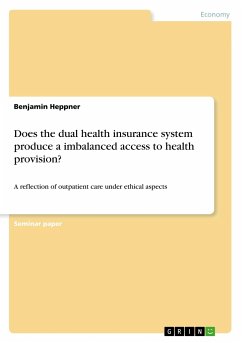Seminar paper from the year 2019 in the subject Business economics - Business Ethics, Corporate Ethics, grade: 1,7, Fresenius University of Applied Sciences Hamburg, language: English, abstract: This paper examines the effect of the dual health insurance on medical care in the outpatient sector, which stakeholder groups are still affected in addition to patients, and what the ethical outcome is. The dual health insurance system consists of statutory health insurance (SHI) and private full health insurance (PHI). About 72 million people in Germany are covered by one of the 110 statutory health insurances and around 9 million by the private sector. In 2016, a total of around 3565 billion euros were spent for healthcare. Outpatient treatment in doctors' practices accounted for 14.9% of this total.Different research papers has shown, that the waiting time for a treatment is an indicator to measure imbalance access to health services. In two reports, different waiting times for SHI and PHI insured persons at a doctor's appointment could be determined. The length also depends on the distance to the end of the quarter, which is due to different rates paid to the doctors.This unequal treatment was considered from an ethical point of view from the point of view of Utilitarianism and Kantianism. Both legitimize this procedure, but it must be questioned whether a fundamental change would not be more beneficial. However, the different access to health care does not represent a lower quality of medical treatment. Recent studies have shown that SHI insurants even receive the better benefits and that there is only a difference in service.








